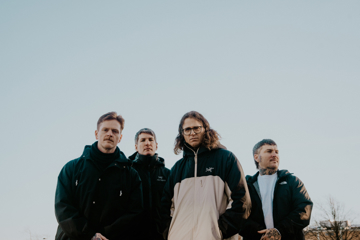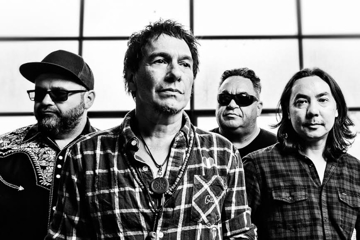We Can Be Heroes
"I definitely don’t think Royals is my best song."

Ella Yelich-O'Connor, better known to the world as Lorde, is enjoying mainstream pop success at its most immense. She's broken all manner of records with regards to her age, her gender and her country of origin in terms of sales and chart positioning, but nine weeks atop the US singles chart with her track Royals – which has now almost sold five million copies in that country alone – is the ultimate proof that what has happened here is mammoth.
When we speak, she's preparing to fly to LA for the Grammy Awards, where she'll be performing and is nominated for four awards, enjoying some rare time in her own Auckland bedroom.
“It's super messy,” she giggles. “I fly out tomorrow, so there's stuff all over the floor.”
There aren't many 17-year-olds who could command a headlining slot on the St Jerome's Laneway Festival, but comparatively such an engagement appears almost insignificant. Lorde's signed a publishing deal reportedly worth around four million dollars, appeared on the cover of Rolling Stone in the US and will be a huge fixture on the US and European festival circuit through 2014. But how do you deal with going from being a nobody to the most in-demand artist on the planet?
Don't miss a beat with our FREE daily newsletter
“I think when it's happening to you it's less weird,” she says. “For example, being on the cover of Rolling Stone, you're like 'that never happens to people like me', but then you're among the people who have been on the cover of Rolling Stone and it's not so weird. I've adjusted to things, I think.”
It has been Royals that has resonated with audiences around the world so much. That's the song that's topped the charts and has been flogged to death on almost every format of radio with a vaguely youthful orientation, the song that's been lauded and derided (both are very important) ad infinitum and it's simply the song that everyone knows. It's interesting then to hear Yelich-O'Connor's take on the song. Is it her best?
“No!” she exclaims. “I definitely don't think Royals is my best song. I understand why it worked and why it was kind of a hit, I can see those qualities in it, but at the same time there's part of me that's like…” she groans, “'these melodies are just not as good as something I could have written now', or like 'I definitely wouldn't have written this lyric this way if I had've written it now'. But I was 15 when I wrote it and I'm 17 now, so I think you grow a lot in that period. It definitely feels like a bit of a relic now.”
Reading certain reports about Lorde's persona, you'd expect an overtly headstrong diva who'll pounce on any chance to belittle you; but the truth is, she's just a very switched on and very polite teenage girl. Hearing her speak about the moment she realised she was going to be allowed to take time away from school to write her album is enough to fill anyone with youthful glee.
“I was so for it, I was kind of freaked out, but I really wanted to do it,” she says of following up her early success with her debut album Pure Heroine.
“It was pretty much down to my parents, because obviously I had to take three months out of school. They came home from this meeting with my manager and said 'we're gonna let you make the record' and I was like 'YEEEEAHHH this is gonna be awesome!!!'”
This was not the plan. Royals – and The Love Club EP it came from – were not meant to become this massive. Lorde was not supposed to have an album out yet. Yelich-O'Connor didn't just want to capitalise on the success of the single, she wanted what people heard from her after Royals to be something from the same woman at a similar time in her life.
“I feel like most pop stars have this plan written in stone years before anything happens but the song started taking off and I was like 'Oh, okay…' and then we had to plan for what was gonna come next.
“Before I put The Love Club EP out I was just planning on releasing EPs and messing around and putting stuff on the internet until I finished high school and then I would kind of look at it more seriously. But obviously things went kind of crazy and, what happened to the music once it left my hands was, like, just this insane thing. So I had to rethink and decide when I wanted to write the record; it was important to me that I followed up this big song with material that I felt was relevant to me right now and which felt kinda fresh and did come at the same time as that song, I guess. It wasn't a plan that was thought out well in advance.”
Due to Yelich-O'Connor's own personal relationship with music, she couldn't particularly envisage her material resonating with a wide, popular audience. It's not that she didn't have faith in it, it's just that it's her music, largely written by, about and for her.
“For me, I know a record is important to me if I can hear my life in it. If you write super personally, like I do, the worry for me is that if it means so much to me then it's not gonna mean too much to other people because it's going to be too specific or whatever,” she explains.
“I feel like a lot of people my age really reacted to it which is so cool for me and is kind of the dream. I was lucky. I feel like teens are a tough audience and I feel like a lot of the art and that a lot of the material aimed at teens is usually super corny and feels patronising or whatever, and I am aware of that. But people I guess didn't feel that about Pure Heroine which is super cool.”
She's a relatable voice for the not-so-disenfranchised teen market who aren't necessarily interested in the ersatz world of Bieber, Taylor and Miley. Her brand of cool is certainly defined, but it's accessible. Whether Lorde likes it or not, she has become a role model, and if her success continues then she'll be one for a long time to come.
“That's a crazy one because, obviously I am 17, I'm going to fuck some stuff up at some point, because I think that's a natural part of becoming an adult,” she says when asked if she's comfortable with such exemplar status. “But as long as people are willing to accept me as an imperfect role model, then I guess I'm honoured.”
Yelich-O'Connor's unwavering commitment to ensuring her creative vision is fulfilled is beyond admirable, particularly given the scale of the success or failure she holds in her hands. As far as how such a young woman gets such a strong say when dealing with multinational record labels and powerful managers goes, she says she just started early.
“Basically from when I was 12 or 13 I've been calling the shots in regard to my own career and my management and label have been super open to that, which is weird because lots of adults who've been doing what they do for a long time don't really want to take direction from someone who is just starting high school,” she says. “But I've always known what was best for my art and what I was doing and people have kind of respected that. I guess I've just been saying how things should be for long enough that people don't really question it anymore.”
That doesn't mean the 17-year-old doesn't stress about the weight of these decisions. When it comes to the Lorde brand, there are quite literally millions of dollars at stake and the wrong move could see the artist and all those around her lose out immensely. But simple wisdom has helped her get through thus far.
“Some of the stuff I have to decide about isn't creative, it's to do with my brand in a way, which is definitely something which can be hard and something I'm often up all night thinking about,” she admits. “At the end of the day – and it sounds so cliché – I just go with my gut. Even if I ask a bunch of people for advice and they say 'do this' or 'don't do this' I usually go with the thing that I first thought.”







